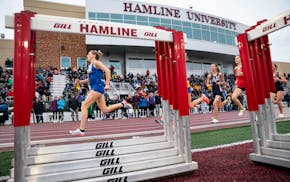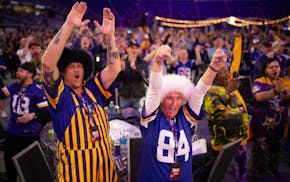When Full Throttle Series drag racers Courtney Force and Erica Enders -- two women, Lord have mercy -- each won races at the same national event two weeks ago and made history, the motorsports world went abuzz again.
Stories about women and their new success stole the headlines after the pair marked the first time two women have won at the same event in the 61-year history of the sport.
But NHRA announcer and longtime historian Bob Frey had only one message to dish out: What's new?
"It's funny," Frey said. "One of the things that is our strength really almost gets overlooked. We've had women running in drag racing literally since back in the 1960s. ... The fact that two of them won at the same race is obviously an anomaly because that's the first time it happened in the professional classes. But to have two women win in a race really is not a surprise."
What is a surprise is that the topic is still getting so much focus as the ranks of women in drag racing grow each year, with the sport's females crossing new "firsts" off the list and winning ever more accolades, even as they are still looked at distinctly because of their gender.
"I don't get tired of it," said Courtney Force of the "female questions" she continually gets. Force is a pro class rookie who won in only her 15th career Funny Car race at the O'Reilly Autoparts Northwest National in Seattle on Aug. 5. She and Enders will compete in the Lucas Oil NHRA Nationals in Brainerd starting Thursday.
"I'm the one that went into a male-dominated sport, so I've got to expect it," Force said. "I think that more and more women are going to be coming into the sport and not just out there to race. We're out here to win."
While drag racing is still a male-dominated sport, that conventional image is changing. Unlike most other motorsports, including the largely white-male NASCAR, drag racing is surprisingly diverse -- not only when it comes to gender, but race as well. The NHRA is home to African-Americans (including Antron Brown, the driver leading in the points in the Top Fuel category), Hispanic and Middle Eastern drivers in both the pro classes and the Lucas Oil classes. Thirteen women have now won at the pro level, and that number jumps to 62 if including the Lucas Oil classes (the "Nationwide Tour" level of drag racing).
"If [NASCAR does] anything even out of the ordinary, all the sudden everybody's going, 'Wow, that's great,'" said Frey, noting how NASCAR star Danica Patrick's gender is often flaunted as a marketing tactic. "For us, it's almost second nature."
Women first broke into the sport in the 1960s, when Barbara Hamilton and Shirley Shahan came in as drag-racing pioneers. Shirley Muldowney was the first to become extremely successful -- winning her first world championship in 1977 and going on to win two more, despite having to "fight and claw" against those who didn't want her to succeed, Frey said.
"She made it acceptable because she went out and beat the guys on their own turf," Frey said. "She was on fire and had crashes and kept coming back, and just showed that the fact that she was a woman wasn't going to deter her."
That opened the floodgates, Frey said, for women to follow, and the opportunities and culture of acceptance that have become standard are likely reasons there are far more women -- and successful women -- in drag racing than in any other motorsport.
"When you put your helmet on, it doesn't matter," said Enders, who won the Pro Stock category in Seattle, the first time a woman had ever won in that class. "You know, there's no reason why we can't compete at this level."
Add Enders and Force to a long list of women in the sport who have felt exactly the same way.

Hamline Elite Meet, already in rare air, presents co-ed look for track
Bevy of defensive playmakers are available in Round 2 of the NFL draft after historic offensive run
Twins bring momentum on road despite Angels Stadium struggles

Neal: McCarthy mania sweeps through Vikings draft party

